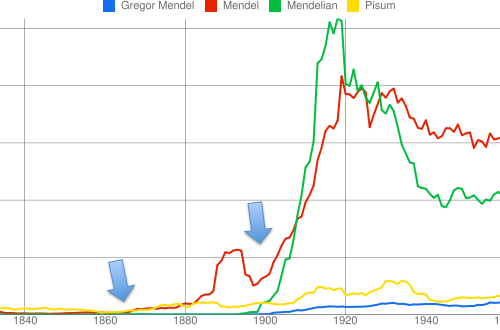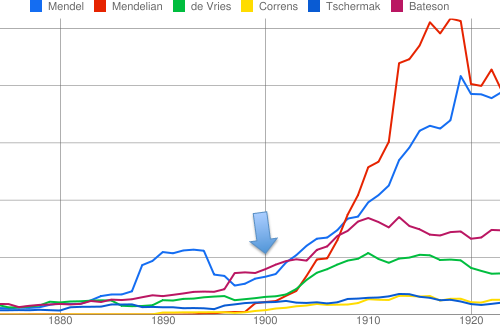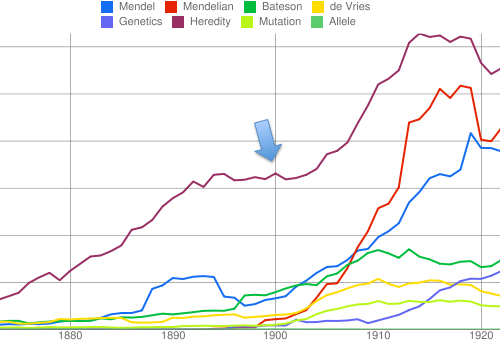To start off, we plot the terms "Gregor Mendel", just "Mendel", "Mendelian" as well as the genus of the garden pea Mendel worked with, "Pisum".

Not surprisingly, the years 1866 and 1900 (or there around) stand out markedly.
1866 was of course the year Mendel published his paper Experiments in Plant Hybridization, and we can see that mentions of his name, or at least his surname, and mentions of the garden pea Pisum start going up significantly. Mendel's intention with the paper was explicitly to inspire others to repeat his experiments, and he was apparently disappointed over the fact that nobody did; but it does seem like there was an awareness of his work in the late 1800s, and although the mentions of Pisum couldn't all come in reference to Mendel's work, it's remarkable how 1866 sticks out. You can repeat the experiment in German.
1900 was the year Mendel's work was re-discovered in publication and introduced to a wider scientific audience, through the independent publication of papers by Hugo de Vries, Carl Correns, Erich Tschermak and William Bateson, although none of them did immediately realize the power of Mendel's work or accepted it fully to account for the patterns of heredity they had observed in their own experiments. Nonetheless, we see that the use of the term "Mendelian" as an adjective has a large impact starting in 1900, which speaks for the introduction of Mendelian inheritance laws in a broader theoretical framework. Looking at the source data reveals mentions of "Mendelian phenomena", "Mendelian allelomorph", "Mendelian characters", "Mendelian crosses", "Mendelian factor", "Mendelian inheritance" et c.
If we plot the names of these scientists together with "Mendel" and "Mendelian", there seems to be a corresponding increase in mentions around 1900, at least for de Vries and Bateson. Although it doesn't seem to be that correlated, at first glance, with the increase in mentions of Mendel and "Mendelian". Could it be that; although de Vries, Correns and Tschermak claimed the re-discovery of Mendel for themselves, and Bateson claimed the introduction of Mendel in Britan; they themselves were not as often associated with the subsequent breakthrough of Mendel's ideas?

In my previous post I wrote about whether or not Mendel has predicted the existence of genes. While the terms "gene" and "genetic" were well in use by the early 1900s, it was William Bateson who introduced the term "genetics" as the study of biological inheritance. If we plot terms such as "Genetics", "Heredity", "Mutation", "Allele", together with "Mendel", "Mendelian", "Bateson" and "de Vries", who introduced the term "mutation", we see that the era of classical genetics that was to come in the first decades of the 1900s was already brewing when the "re-discovery" of Mendel happened. But it's undoubtable that Mendel's ideas were essential for the breakthrough of genetics in biology.

If you want to read more about the rediscovery of Mendel in 1900, I recommend the following papers as an insight into the sometimes very personal stakes involved. They were the ones I researched before writing this post.
Weinstein, A. (1977). How unknown was Mendel's paper? Journal of the History of Biology, 10 (2), 341-364 DOI: 10.1007/BF00572646
Olby, R. (2009). William Bateson's Introduction of Mendelism to England: A Reassessment The British Journal for the History of Science, 20 (04) DOI: 10.1017/S0007087400024201
Lenay C (2000). Hugo De Vries: from the theory of intracellular pangenesis to the rediscovery of Mendel. Comptes rendus de l'Academie des sciences. Serie III, Sciences de la vie, 323 (12), 1053-60 PMID: 11147091
No comments:
Post a Comment
Note: Only a member of this blog may post a comment.